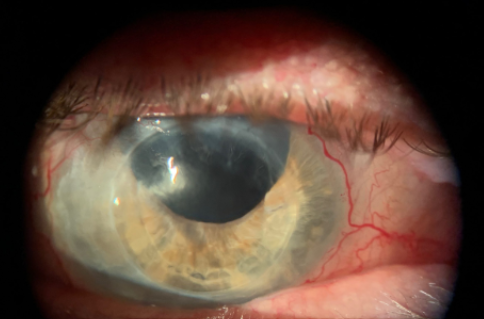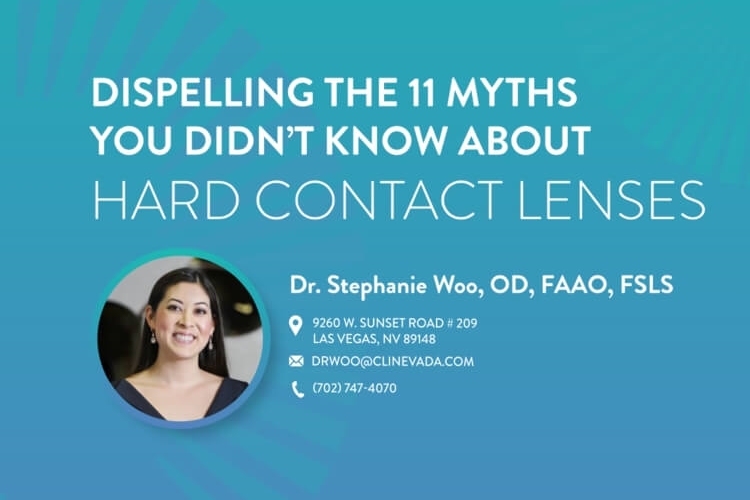Corneal edema occurs when the cornea, which is the front structure of the eye, swells due to water being retained within the cornea. There are many different reasons for the corneal to swell and corneal edema to occur. The most common of these are problems with the corneal endothelium, long-term or overnight contact lens wear, and following surgery. Each of these can cause corneal edema – especially in someone who wears contact lenses full-time.
What is the Cornea?
The cornea is the clear front structure of the eye. The cornea is responsible for bending light into the eye and creating an image on the back of the eye.
In a healthy eye, the cornea is around 550 microns thick and is regulated by the amount of water within the cornea.
The cornea must remain clear to allow for the best vision and the collagen and water content within the cornea is tightly controlled to maintain the proper clarity.
When Does Corneal Edema Occur?
Corneal edema occurs when the amount of water within the eye is increased because of water being retained within the cornea.
When the cornea swells, it can become greater than 600 microns and become hazy instead of completely clear.
Water content is regulated by the inner layer of the cornea, called the corneal endothelium.
When the corneal endothelium is damaged or becomes less effective, the amount of water within the cornea will increase and the cornea will swell.
Corneal Edema from Corneal Endothelium Dystrophies
One of the most common causes of severe corneal edema is the presence of underlying corneal endothelium dystrophy.
The most common dystrophy of this type is called Fuch’s Dystrophy.
In these conditions, the corneal endothelium has abnormally shaped cells that do not function as well as other, proper endothelial cells.
Since the corneal endothelium has reduced function, the amount of water that is removed from the cornea each day is reduced, and the cornea will swell and cause corneal edema.
What are Dr. Woo's thoughts on Scleral Lenses and Corneal Edema?
While most patients will not need to worry about corneal edema, there are a few special patient populations that we need to monitor carefully.
If a patient has any of the following, we should proceed with caution:- Fuch's dystrophy- Low endothelial cell count- Polymegathism- Pleomorphism- Corneal transplant- Any other issue that could compromise the corneal endothelium Our particular patient had a full thickness corneal transplant (PKP) in his right eye.
He also has an Ahmed valve superior temporal.We fit him into a custom scleral lens. At insertion, you can see the central clearance is acceptable around 200um, and the corneal thickness/pachymetry is measure upon insertion.
Next, the images show that after 4 hours of wear, there is ZERO central clearance, and the cornea has swelled. This is likely due to a compromised endothelium from the corneal transplant. Our plan is to add in fenestrations into the scleral lens to gain more oxygen to the cornea. If that does not work, we will design a custom gas permeable lens for him.
Corneal Edema from Contact Lens Wear
Another common cause of corneal edema is prolonged contact lens wear. Contact lenses inhibit the transfer of oxygen from the cornea to the tear film.
Specifically, when contact lenses are worn overnight, the cornea will swell and cause corneal edema upon waking in the morning.
This corneal edema is usually transient and will resolve fairly quickly. However, the edema can still cause problems – especially if the contact lenses are worn every night.
Corneal Edema after Surgery
When an eye surgery is performed, namely cataract surgery or a corneal transplant surgery, the cornea can swell in the postoperative period.
The eye will be inflamed from the trauma to the eye during surgery and if the corneal endothelium becomes inflamed or damaged, there can be excess water retained within the cornea.
Usually, as the recovery from the surgery continues, the cornea edema will resolve completely to pre-operative levels.
The concern of Corneal Edema
In many cases, corneal edema will not cause any long-term problems. However, there are additional risks for individuals who wear contact lenses.
Contact lenses – especially specialty contact lenses – rely on the shape of the cornea to both fit and provide clear vision.
If there is corneal edema for an extended time, it can result in reduced vision and even corneal scarring.


